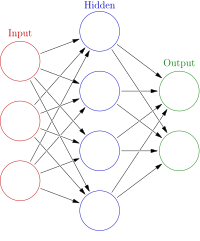
Photo from wikipedia
Network analysis is an emerging field for the study of psychopathology that considers constructs as arising from the interactions among their constituents. Pairwise effects among psychological components are often investigated… Click to show full abstract
Network analysis is an emerging field for the study of psychopathology that considers constructs as arising from the interactions among their constituents. Pairwise effects among psychological components are often investigated by using this framework. Few studies have applied Bayesian networks, models that include directed interactions to perform causal inference on psychological constructs. Directed graphical models may be less straightforward to interpret in case the construct at hand does not contain symptoms but instead psychometric items from self-report measures. However, they may be useful in validating specific research questions that arise while using standard pairwise network models. In this study, we use Bayesian networks to investigate a well-known psychological construct, empathy from the Interpersonal Reactivity Index, in large two samples of 1973 university students from Belgium. Overall, our results support the hypotheses emphasizing empathic concern (i.e., sympathy) as causally important in the construct of empathy, and overall attribute the primacy of emotional components of empathy over their intellectual counterparts. Bayesian networks help researchers identify the plausible causal relationships in psychometric data, to gain new insight on the psychological construct under examination, help generate new hypotheses and provide evidence relevant to old ones.
Journal Title: Psychological reports
Year Published: 2022
Link to full text (if available)
Share on Social Media: Sign Up to like & get
recommendations!